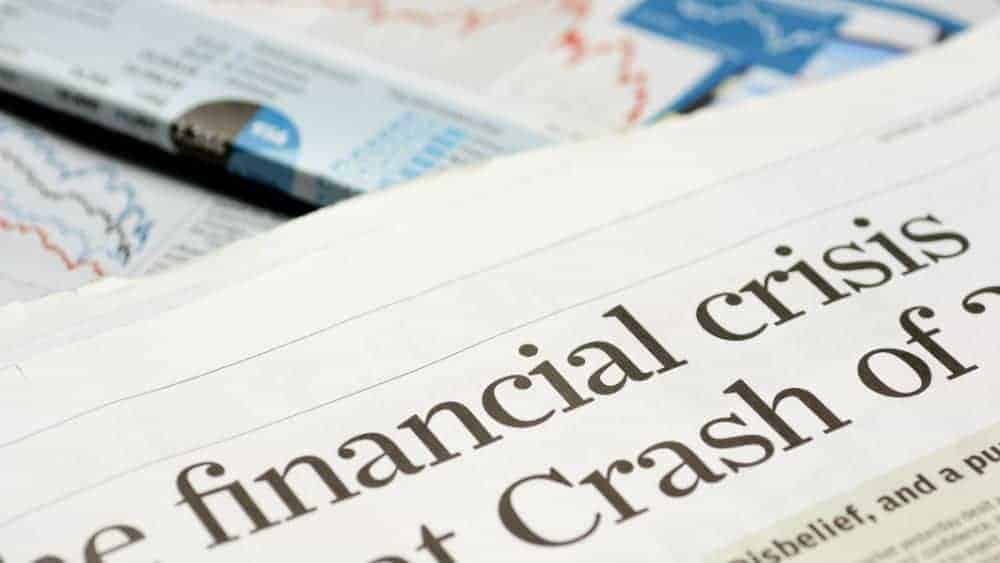Fears of a global economic slowdown and recession continue to grow. A range of signals, including weak manufacturing data, growing signs of an emerging economic slump in the Eurozone, the U.S.-China trade war, and an economic slowdown in China, don’t bode well for the global outlook. Those factors, along with the bond yield curve inverting recently, which has occurred before every single U.S. recession over the last 50 years, is fueling considerable fear that a recession is looming. Such an event will bring what has been the longest-running bull market in history to an end.
How severe will the next recession be?
There is substantial concern that a major economic downturn could trigger another financial crisis similar in scale to the Great Recession of just over a decade ago. This is because a combination of very low or negative interest rates and overreliance on quantitative easing has left central banks with very few policy tools to head off or combat the next recession.
That — combined with a massive global debt overhang and fiscally weak governments in Europe and among emerging markets — means that a crisis could spread rapidly across the globe, sharply impacting developed economies like the U.S. and Canada. Stagnant wage growth and a sharp decline in savings will magnify and draw out the impact of a recession. As the downturn deepens, it would trigger a range of events that would cause the crisis to intensify as spending contracts, business confidence falters, and unemployment grows. That would cause stocks to crash and potentially sink to lows not seen since the Great Recession.
Not all market pundits share this view. Steve Eisman, of Big Short fame, who successfully predicted the 2007 U.S. housing meltdown and ensuing financial crisis, believes that recession won’t trigger a catastrophe. He has taken this stance primarily because systemically important U.S. banks aren’t overleveraged as they were over a decade ago. It was this, coupled with many high-risk, low-quality subprime mortgages being packaged into supposedly low-risk debt derivatives, that caused the last financial crisis to spread at an accelerated rate across the global financial system. The lack of subprime mortgages and related derivatives coupled with stricter fiscal regulation further indicates that the next recession won’t trigger a major crisis.
Banks are vulnerable
The growing consensus is that the downturn, while not deep, will be drawn out and have a marked impact on an already struggling retail sector, the banks, and commodities. Canadian banks have long been a major target for short-sellers. Eisman believes that as the credit cycle normalizes and loan quality deteriorates, their earnings, and hence stock prices, will decline. As a result, the Big Five banks are now the five most shorted stocks by value on the TSX with Toronto-Dominion (TSX:TD)(NYSE:TD) ranked first followed by Royal Bank of Canada, Bank of Montreal, Bank of Nova Scotia, and Canadian Imperial Bank of Commerce.
Toronto-Dominion is thought to be the most vulnerable because of its considerable U.S. exposure, where it is rated as a top-10 bank. Canada’s second-largest mortgage lender earns 39% of its net income south of the border, and the U.S. market has become a key growth driver for Toronto-Dominion. That, along with it being the second-largest lender in Canada, means that Toronto-Dominion will have considerable exposure to the next recession.
Nevertheless, the impact may not be as severe as the short-sellers believe. A considerable portion of the bank’s Canadian mortgages are insured, and those that aren’t have a conservative average loan to valuation ratio of 54%. Toronto-Dominion also finished the third quarter with a low gross impaired loan ratio of 0.42%, which was three basis points lower than a year earlier, while the value of impaired loans was almost 1% lower, indicating that credit quality is improving.
Foolish takeaway
The likelihood of a recession and subsequent market correction is growing, but it may not be as severe some pundits believe. While there are emerging headwinds for Canada’s banks, the impact won’t be as harsh as short-sellers believe because of tight prudential regulation, conservative underwriting standards, high-quality credit portfolios, and robust balance sheets. That means investors should not overreact and reduce their exposure to the big banks.









